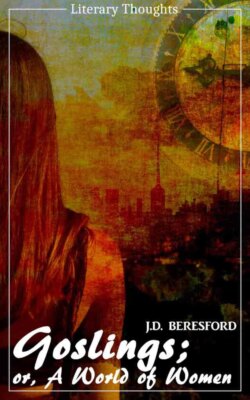Читать книгу Goslings (John Davys ("J.D.") Beresford) (Literary Thoughts Edition) - J. D. Beresford - Страница 18
На сайте Литреса книга снята с продажи.
V—THE CLOSED DOOR
Оглавление1
There was a lull for forty-eight hours after that announcement of the case of the new plague in Berlin, and Maxwell was beginning to regret his headlines when the news began to come in, this time in volume. The Russian censorship had broken down, and the news agencies were suddenly flooded with reports. There were several thousand cases of the plague in Eastern Russia; the north and south were affected, many men were dying in such towns as Kharkov and Rostov; there were a dozen cases in St Petersburg; there was a such a rush of reports that it was quite impossible to distinguish between those that were probably true and those that were certainly false.
The morning papers gave as much space as they could spare, and had even broken up some of the matter dealing with the arrangements for the opening of Parliament on that day. But the evening papers had news that put all previous reports in the shade. Eleven more cases were reported in Berlin, three in Hamburg, five in Prague and one in Vienna. But more important, more thrilling still, was the news that H.I.H. the Grand Duke Kirylo, the Tsar’s younger brother, had died of the plague in Moscow, and Professor Schlesinger in Berlin. Until that startling announcement came, the English public had incomprehensibly imagined that only peasants, Chinamen and people of the lower social grades were attacked by this strange new infection.
In the later editions it was reported on good authority that Professor Schlesinger had been observing a sample of the blood of the first case of plague that had been recognized in Berlin.
Nevertheless the majority of readers, after glancing through the obituary notices of H.I.H. the Grand Duke Kirylo and of the world-famed bacteriologist, turned to the account—only slightly abbreviated—of the opening of Parliament. And in many households the subject of the new plague gave place to the fiercely controversial topic of the English Church Disestablishment Bill, which had been indicated in the King’s Speech as a measure that was to be introduced in the forthcoming session. Many opponents of the Bill coupled the two chief items of news and said that the plague was a warning against infidelity. It may be assumed that they found sufficient warrant for the killing of a few thousand Russians, including a prince of the blood and a great German scientist, in the acknowledged importance of England among the nations. The death of half a million or so Chinamen in the first instance had been a delicate hint; now came the more urgent warning. Who knew but that if this sacrilegious Bill were passed, England herself might not be smitten. When warnings are disregarded, judgments follow. The Evangelicals found a weapon ready to their hands....
But what precisely was the nature of the new plague, none of the journals was as yet able to say. The symptoms had not as yet been “described” by any medical authority, for it appeared that, contrary to modern precedent, the doctor himself, despite all precautions, was peculiarly subject to infection. Out of the eleven new cases in Berlin, no less than four were medical men.
From the layman’s point of view the symptoms were briefly as follows: Firstly, violent pains at the base of the skull, followed by a period of comparative relief which lasted from two to five hours. Then, a numbness in the extremities, followed by rapid paralysis. Death ensued in from twenty-four to forty-eight hours after the pains were first experienced. No case, as yet, was known to have recovered. A well-known physician in London gave it as his opinion that the disease was a hitherto unknown form of cerebro-spinal meningitis of unexampled virulence. He protested that the word “plague” was a false description, but that word had already been impressed on the public mind, and the disease was spoken of as the “new plague” until the end.
